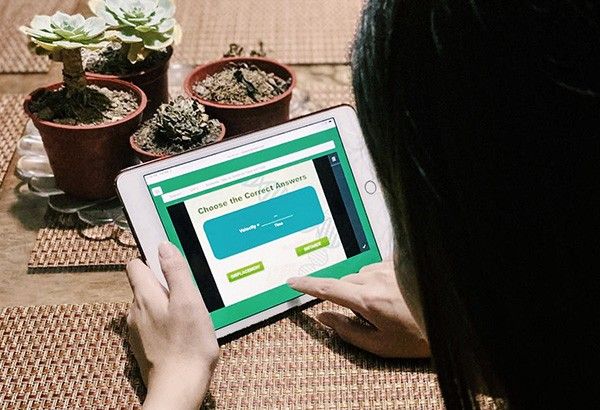Distance learning problems? Experts give tips to prevent 'academic freeze'

MANILA, Philippines — To say that the COVID-19 pandemic is a game changer is an understatement.
Online learning has replaced the physical classroom. Teachers and students interact through the computer screen and in the comfort of home. There’s no school service to catch, no school bag and lunch box to pack.
Mom and dad are just a few steps away, working from home themselves. They can walk over to the next room and check on their children’s assignments after their Zoom meetings.
The new school set-up demands a new set of skills from parents. Otherwise, like dinosaurs, they will lag behind. They have to know that a stable internet connection is only half the battle.
In an episode of "Smart Super Woman" webinar through "S Talks," Ahead Tutorial and Review Center president and founder Rossana Llenado; mom entrepreneur Mylene Abiva, the first and only World Robot Olympiad Ambassador to represent 66 member nations at the World Robot Olympiad; and financial journalist Salve Duplito discussed requirements for online learning.
These are:
Family rules
With no school bell to signal the start of classes and no teacher to herd them into the classroom, time management is important.
“Children need boundaries,” Abiva explained. “There should be two hours for study, another two for socials, the rest for family.”
Without this kind of structure, she warned, children will cling to their device and sleep with it. Discipline flies out the window if the internet is always on. You have to switch it off.
Duplito admitted that some moms give in to their children’s requests, believing that they’re entitled to happy times because they’re depressed. Abiva warned that not having rules could backfire on parents, who must have a united front in enforcing discipline.
She suggested writing down a list of tasks in Manila paper, posting it on the wall, and putting tick marks beside completed tasks. Parents can give incentives for finishing the week’s work.
Duplito, a mother of four, stresses the value of patience. Instill discipline on a staggered basis, she said. Don’t expect your child to wake up at 7 a.m. if he’s been up till 2 a.m. the same day.
A quiet time and place to study
Duplito observed that not all of us have little corners of the room to ourselves. A lot of families live in cramped spaces, where everyone is online. What to do?
The answer is respect for others’ time. If mom or dad is in a Zoom meeting, or engaged over the mobile phone, ask questions later. Don’t walk around in the background and distract people in an online meeting. Focus is important. So train your child to log in 15 minutes ahead of time. You can’t just log in five minutes after a meeting started.
Privacy of information
The information age teems with dangers for children. No one is safe online, so Llenado stressed the need to protect information children get. Parents must put a cap on the time their children spend online.
Duplito added that children must be protected from what they download. They must have limits in playing online games.
That’s why mom and dad must install browsers that offer parent controls to make sure every content the child downloads is safe. The school’s name and other sensitive information must be private. Chat rooms must be secure from outsiders. It helps that you get the right device for your kids.
Abiva advised parents to set time limits for Zoom meetings and virtual events. Teach children, especially younger ones, to surf the Net safely. Pay for online protection if needed.
A tutor
This pandemic has turned more parents into their children’s teachers. But not all parents can teach, especially more complex subjects. Llenado said that teachers took up four-year courses to qualify as educators. Others took further studies. But parents don’t even get on-the-job training as teachers.
A tutor can help. Llenado said Ahead’s seminars train parents to be their children’s teacher, especially in this pandemic. These also give parents feedback on how their children are doing in school.
The power of virtual group study
Abiva observed that children teach and encourage each other when they see other students struggling. That’s why virtual group study helps. It’s also a great way for children to bond with peers.
This pandemic, like all crises, is a blessing and a curse. It is a blessing when it cements family ties. It can help parents guide children in their studies even more, and children listen to mom and dad longer, more intently.
Abiva said it best: “Now’s the time to be better, not bitter. It’s up to us to use this opportunity to be a better family, better moms, better wives, better businesswomen. It’s a test of faith and perseverance. We’re natural multi-taskers. We’ve gone through giving birth. This is a walk in the park.”
"S Talks" help women reach their potential with the help of women who are successful in their own fields. The talks feature female professionals discussing women-oriented topics.



















